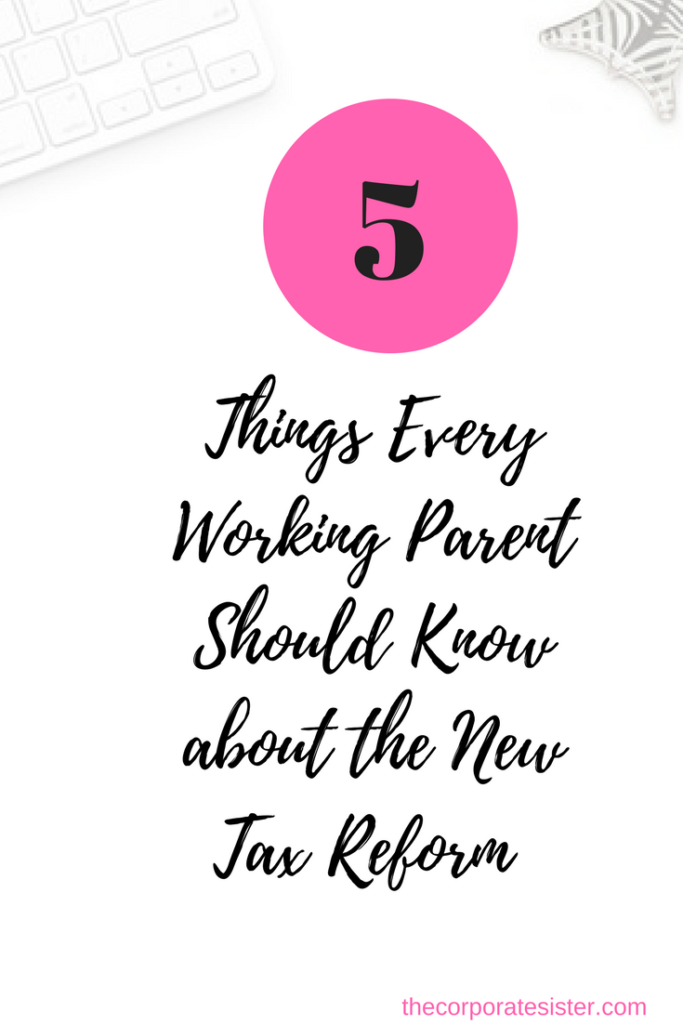
by Solange Lopes | Jan 23, 2018 | Working Mom & Woman Tips
 As of December 2017, a new tax reform law has been signed into effect, affecting working parents and families in significant ways. Depending on their particular circumstances, some working parents may notice an increase in their taxes, while others may be getting a break.
As of December 2017, a new tax reform law has been signed into effect, affecting working parents and families in significant ways. Depending on their particular circumstances, some working parents may notice an increase in their taxes, while others may be getting a break.

If you are a working parent, here are 5 ways you and your family be impacted tax-wise going forward:
-
If you’re married, your family may benefit from a tax cut
The new tax bill doubles your standard deduction as a married couple, which translates into a tax cut for most families. However, if you happen to reside in an expensive city and you itemize your deductions, you may be at a disadvantage. The reason for this is that sales and property taxes, as well as state individual income deductions have been capped at a total of $10,000, which limits how much you can deduct if you are in those expensive cities.
-
If you’re in a high-income household, you may get a sizable break
Higher-income households, most specifically those earning between $500,000 and $1 million per year, will benefit from the biggest tax break. It may sound unfair but it’s the reality.
-
No such luck for single parents
If you happen to be a single parent, you may have relied previously on a number of personal exemptions that were associated with filing as “head of household”. The new tax bill has done away with these personal exemptions, which means that a single parent would incur more taxes than a married family, and this despite the doubling of the standard deduction.
-
You will benefit from a larger child tax credit
The child tax credit has been doubled to $2,000 from $1,000. The refundable portion is also larger than it used to be, which will benefit more lower-income families. However, in the end, wealthier families will still benefit more than single families.
-
our family may have access to more paid leave
The new paid tax leave credit for companies encourages businesses to offer employees earning less than $72,000 up to 12 weeks of paid leave in exchange for a tax break. This may benefit working parents who desire to take more paid leave.
Got any tax-related questions? Click HERE to contact our sister consulting website SW Consulting.
To Your Success,
The Corporate Sister

by Solange Lopes | Jan 11, 2018 | PODCAST
 Welcome to Episode #12 of The Corporate Sister Podcast! This episode is all about the big P word…yes, Productivity! Or how we can be more productive as working women, especially as we start this new year 2018! Listen in for tips on avoiding the cult of “busy-ness”, doing more in less time, and controlling your time!
Welcome to Episode #12 of The Corporate Sister Podcast! This episode is all about the big P word…yes, Productivity! Or how we can be more productive as working women, especially as we start this new year 2018! Listen in for tips on avoiding the cult of “busy-ness”, doing more in less time, and controlling your time!
SCROLL DOWN TO THE BOTTOM OF THE POST TO LISTEN TO THIS WEEK’S EPISODE!
Links:
Thanks for Listening!
Thanks so much for tuning in and listening to this week’s episode! If you enjoyed this week’s episode, please share it by using the social media at the bottom of this post!
Also, leave me a review for the TCS podcast on iTunes!
Got questions? Email me at corporate@thecorporatesister.com!
Finally, please don’t forget to subscribe on iTunes to get automatic updates!
Any feedback you’d like to share? Please leave a note in the comments section below!
Podcast: Play in new window | Download
Subscribe: Android |
Podcast: Play in new window | Download
Subscribe:

by Solange Lopes | Dec 26, 2017 | Career
 Being a woman of color at work also means facing unique challenges, such as being the only one in the room or fighting the proverbial “concrete ceiling” in business. This also means that fitting in can be an uphill battle, especially in environments with blatant racial bias or covered stereotypes. In many instances, we may feel that we have to compromise on our true values in order to be accepted as who we are. Or that we must leave ourselves at the office door for fear of being rejected. However, how effective is it to compromise one’s integrity for success, at work or anywhere else for that matter?
Being a woman of color at work also means facing unique challenges, such as being the only one in the room or fighting the proverbial “concrete ceiling” in business. This also means that fitting in can be an uphill battle, especially in environments with blatant racial bias or covered stereotypes. In many instances, we may feel that we have to compromise on our true values in order to be accepted as who we are. Or that we must leave ourselves at the office door for fear of being rejected. However, how effective is it to compromise one’s integrity for success, at work or anywhere else for that matter?
As a woman of color at work in Big Corporate, I found myself in many cases wondering about how I could fit in better at work. As an African immigrant, a Black woman hailing from a richly diverse background, being in rooms where I was the only one had me constantly pondering on ways to fit in better without selling out. As an introvert, the challenge was amplified even more.
Most will tell you to just “come as you are”, “be who you are”, you know, “do you”. In many contexts, this is definitely sound advice. Yet, when your paycheck and by extension your professional future, depends in large part from how you are perceived, dynamics may operate a tad differently. When you have to wonder whether wearing your hair natural may cost you the promotion, or if sounding a certain way will disqualify you from advancement opportunities, the game changes.

For many, if not most of us, being double minorities in the workplace goes without saying. Fitting in with integrity in some work environments may not always be possible. However, as all challenges, deciding to use this as a constructive, rather than destructive, experience is a matter of perspective. I’d personally rather go the constructive route, with a few principles to keep in mind whenever we wonder about fitting in at work as women of color:
-
Assess your environment
All professional environments are not made equal. Which also means you may need to assess yours as best as you can. There are silent codes and understated office politics at play in any professional setting. Understanding these can go a long way towards figuring out how best to approach your own career progression.
This is not about “selling out” or compromising your integrity to adapt to a give professional environment. It’s about being able to navigate the power plays that are inevitably in action at work.
Who are the people you work with in terms of their personalities, processes and even triggers? How do the dynamics of your particular office work? What have been the experiences of other women, more particularly women of color? The more information you can gather about your work environment, the better positioned you will be.
-
Keep professional at all costs
The capital rule at work can be summed up in one word: “Professionalism”. When in doubt, ALWAYS keep professional! When wondering if you fit in, or how to fit in to your team, department or company in general, go the professional route!
The reality is that no one shows up exactly as they are at work. It would have been much easier to spot hidden agendas and other work shenanigans then. Yet what will always pay off is to put professionalism first!
-
Be professional, but don’t hide out!
Yes, we all wear a mask at work, in one way or another, because: office politics, paycheck needed, urgent coffee need, etc. However, for many women of color at work, it also means that we tend to hide out for fear of not fitting in and being ill-perceived. In turn, it stifles our contributions and impedes our growth.
Sometimes, the best way to fit in is to stand out! Diversity is the catalyst of innovation and progress. However, many times we don’t tell our stories, don’t raise our hands and sit at the back of the room to keep the status quo. It’s up to us to educate, share and empower ourselves and others with our work, stories and initiative.
-
Be open-minded
As women of color at work, we may be the only ones at the table. Or in the cubicle, while the conversation is going on at the table. As much as we may face challenges, it’s also important to be open-minded.
Not everything is negatively directed at you, not everyone is out to get you. Sometimes, it’s about showing up more, speaking your mind, doing your best work, telling your story. Sometimes, it’s about educating the rest of the world on things they may not necessarily know or realize. Every time, it’s about creating an opportunity to learn, grow and become better, for all parties involved.
-
Create your own path
Fitting in as a woman of color at work may also mean creating your own path. No two careers are alike. Neither are two businesses, or life paths for that matter. As much as we may look at what others are doing, be it mentors, colleagues or successful people around us, respecting the uniqueness of our own professional trajectories is key.
For some, it may mean starting a business. For others, it may mean presenting a different perspective at work. For most, it may also be about paying heavy dues to push back the corporate “concrete wall”. Whatever “it” may be, let it lead you to better yourself and others.
-
Make peace with your story
At times, the internalized mental stories and societal stereotypes we pick up as part of our journey as women of color can stand in our way. It’s important to make peace with them, and leaving the associated pressure behind.
I found it was much easier to assume my uniqueness at work when I stopped worrying about what happened before, or what society would want me to believe about myself.
-
Mentor another woman of color
Last but not least, one of the best ways for women of color to fit in at work is to mentor other women, especially other women of color. There’s a need for our particular experiences, challenges and journeys to be shared and used to educate those coming after us.
Keep striving, keep working, but most importantly, keep the door open for others! Be willing to share your story, bring another woman to the room, sit with them at the table. Be a mentor.
What’s your take on it?
To Your Success,
The Corporate Sis.

by Solange Lopes | Nov 29, 2017 | Career
 Sexual harassment has always been rampant in the workplace. While the recent claims and allegations have brought it to light in the past months, this problem has existed for a very long time. Yet, it has been (and still is ) muddied by the many perceptions about what constitutes sexual harassment and what to do about it. This is all the more prevalent as most of the legislations in effect around sexual harassment are decided on by men, while most of the policies around sexual harassment are also written by men in the workplace.
Sexual harassment has always been rampant in the workplace. While the recent claims and allegations have brought it to light in the past months, this problem has existed for a very long time. Yet, it has been (and still is ) muddied by the many perceptions about what constitutes sexual harassment and what to do about it. This is all the more prevalent as most of the legislations in effect around sexual harassment are decided on by men, while most of the policies around sexual harassment are also written by men in the workplace.
So how does one go about recognizing sexual harassment and actually addressing it? As a general rule, ANYTHING of a sexual nature that makes you, as a woman, feel uncomfortable in the workplace, should make you start considering whether it’s sexual harassment or not.
Some examples may include:
- Inappropriate sexual gestures
- Inappropriate touching of a sexual nature
- Anecdotes of a sexual nature or lewd, suggestive jokes
- Suggestive emails, letters or notes
- Inappropriate sexual images in the workplace
- Staring in a sexually offensive or suggestive manner
- Sexual comments about one’s appearance, body parts or clothing items
- Sexually inappropriate videos or pornographic images or objects
- Sexual inquiries or questions (for instance, inquiring about someone’s sexual orientation or history)
- Offensive or sexual comments about one’s sexual orientation or gender

According to the Department of Labor, there are basically two types of sexual harassment:
- Quid Pro Quo Harassment: This is when an authority figure or someone in a position of authority decides of your employment outcomes based on the condition of sexual acts or favor from the victim;
- “Hostile Work Environment” sexual harassment: This is when the harassment creates an intimidating or hostile work environment from the damaging conduct of a sexual nature of co-workers, contractors, customers or supervisors.
These examples above are not all-encompassing. If you encounter any sexual action that contributes in creating a hostile work environment, you may be faced with sexual harassment.
What can you do about it?
If you decide to address it, here are a few steps you can undertake:
-
Get familiar with your company’s anti-harassment policy
Your company should have a policy that informs you on how to file a sexual harassment claim. Look for this policy in your employee handbook or contract, or contact HR to locate it and have access to it. This document will also inform you as to who you should report your claim, what you will have to provide, and what to do if your claim is not addressed. As a side note, you don’t have to inform your manager of any complaint your share with HR. However, if you choose to do so, it may lessen some of the pressure you experience, unless the complaint is against them.
Keep a record of every sexual harassment incident you may have experienced. Document the dates, names and witnesses involved, as well as a detailed description of the events. Save any email or text communication that can constitute evidence.
Keep in mind that you should maintain any supporting documentation on personal devices other than your company computer or property. Forward any email or incriminating evidence to your personal email. Remember that if you’re fired, you won’t be able to retrieve any evidence from company property.
Know that your company’s HR department is not your only recourse. You may want to consult a sexual harassment attorney even before you reach out to your HR department.
You should know that your employer cannot legally retaliate against you under Title VII. You should also keep in mind that if you’re assisting a fellow co-worker in a sexual harassment claim and lawsuit, you’re also protected by the law.
While it’s understandable that you may want to leave a hostile work environment, you should keep in mind that once you quit, you’re no longer able to file a sexual harassment claim on their policy. If you’re interested in filing a lawsuit, you may want to consider filing first before quitting.
-
File a complaint with the Equal Employment Opportunity Commission
In case you have a Title VII complaint, you can file a discrimination complaint with the EEOC. Note that you have 180 days from the date on which you have experienced the discrimination to file. You also do not have to use an attorney to file this complaint. Read more on instructions here.
The EEOC will then notify your employer and begin an investigation. At this point, the EEOC may attempt to settle, file a lawsuit in federal court, or dismiss the charge, depending on the results of the investigation.
-
You can file a lawsuit in court
If your case is dismissed by the EEOC, you will be issued a notice to advise you of your right to sue in court, or a “right-to-sue” letter. You may also request this letter if you want to sue in court before the end of the EEOC investigation.
What other tips would you recommend?
To Your Success,
The Corporate Sister.

by Solange Lopes | Nov 3, 2017 | Career
 Listen, there are some people that you just won’t like. Point blank. It doesn’t matter if you go to church every Sunday, love your neighbor and volunteer at your local soup kitchen every Thanksgiving. If we don’t vibe, we don’t vibe. This is not to say that we have to hate on each other, but vibing can be optional, right? But what happens when we actually don’t vibe at all in these corporate streets where political correctedness is should be the norm, Colgate smile on display and all? How do you manage not liking your co-worker, especially when you have to work with them?
Listen, there are some people that you just won’t like. Point blank. It doesn’t matter if you go to church every Sunday, love your neighbor and volunteer at your local soup kitchen every Thanksgiving. If we don’t vibe, we don’t vibe. This is not to say that we have to hate on each other, but vibing can be optional, right? But what happens when we actually don’t vibe at all in these corporate streets where political correctedness is should be the norm, Colgate smile on display and all? How do you manage not liking your co-worker, especially when you have to work with them?
Statistics tells us that we most likely will not like 10% of the people we meet. Which when you happen to be West African, amounts to a whole lot of people at the summer block party. Yet if you think about it, if you had to like and vibe with everyone, when would you have time to do your weekly curl mask and shave? I’m all for positive energy, but there ought to be some universal balance in play.
Despite what all the Colgate smiles in conference rooms and other corporate streets may convey to you, there are a lot of people out there who do not like their co-workers. Sometimes, for legitimate reasons. Other times, because heating up your fish and palm oil stew in the department’s microwave will not make you friends anywhere. The point is, it happens more often than not, political correctedness or not. While many of us survive this serious corporate affliction on the down low, some of us keep praying for patience and after-hours spiked margaritas.
If you happen to wonder what to do to actually refrain from giving your co-worker a piece of your overheated mind (or fish and palm oil stew), or lose your paycheck over vibin’ differences, here are a few suggestions:
-
See the positive
This may sound counter-intuitive, but there are many instances in which disagreements or dislikes between co-workers stem from a misunderstanding or prior negative assumptions. Instead, grab some calming rooibos tea and contemplate the possibility that there are positive things about them. This may require some extreme concentration; however, you may be able to discern some positive traits, including the fact that they bring local candy from their vacation, that may help you deal going forward.
-
Keep it professional but limit your interactions with them
We all have triggers. Some of them are dressed as co-workers who cut off our vibin’ energy every single time. Once you realize that they may trigger you to behave in a way that is uncharacteristic of who you are, you may want to start pulling away. Not as in running to the other end of the meeting room when they’re present, because: obvious. However, you may consider keeping your interactions purely professional for the sake of your sanity and excessive side eyes.
-
Take a good hard look at yourself!
Reality check: the feelings you have towards certain people didn’t just appear out of thin cubicle air. Very often, what triggers us has to do with our past or something we may have to work on in ourselves.
If this co-worker reminds you of your nagging ex who used to repeat the same thing over and over again, there’s a good chance you need to do some serious soul-searching So grab that sea salt caramel ice cream pint and make a list of the people you need to forgive in your life. You’ll be surprised how much better (and in need of exercise) you’ll feel afterwards.
-
Resist the urge to be petty
Yes, it can be very tempting to go vent about that co-worker we don’t like and even add some hot gossip to the sauce. But remember:
- two wrongs don’t make a wright
- God don’t like ugly
- and you still need karma on your side for when you go ask for that raise next year
Refrain from getting your Certification in Pettiness and Gossip, as hard as it may be. Not only will it ruin your reputation, but it will also eat away at your self-esteem like a hard weave at your frayed edges.
-
If necessary, confront them honestly without being unprofessional
Sometimes, situations at work get out of hand, especially those involving co-workers that are not part of our “Like” stratosphere. If things get hairy with a particular co-worker you don’t like, or they happen to cross your personal and professional boundaries, you may have a talk with them.
However, you want to keep it as professional as possible, and focus on facts instead of feelings. Leave your anger back at your cubicle desk, and address the situation in as rational a way as possible. Politely ask them to stop any inappropriate behavior and to maintain professionalism at all times. And no, you cannot be all that “real”, you’re not Beyonce, this is work and rent is due next week!
How do you deal with co-workers you don’t like?
To Your Success,
The Corporate Sis.

 As of December 2017, a new tax reform law has been signed into effect, affecting working parents and families in significant ways. Depending on their particular circumstances, some working parents may notice an increase in their taxes, while others may be getting a break.
As of December 2017, a new tax reform law has been signed into effect, affecting working parents and families in significant ways. Depending on their particular circumstances, some working parents may notice an increase in their taxes, while others may be getting a break.













